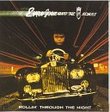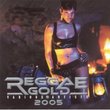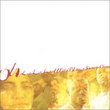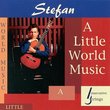| All Artists: Henri Duparc, Thomas Allen, Sarah Walker, Roger Vignoles Title: The Songs of Henri Duparc Members Wishing: 0 Total Copies: 0 Label: Hyperion UK Release Date: 6/21/1993 Album Type: Import Genres: Pop, Classical Styles: Vocal Pop, Opera & Classical Vocal, Historical Periods, Baroque (c.1600-1750) Number of Discs: 1 SwapaCD Credits: 1 UPC: 034571163239 |
Search - Henri Duparc, Thomas Allen, Sarah Walker :: The Songs of Henri Duparc
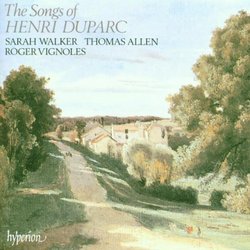 | Henri Duparc, Thomas Allen, Sarah Walker The Songs of Henri Duparc Genres: Pop, Classical
|
Larger Image |
CD DetailsSimilar CDs
|
CD ReviewsBreathtaking 08/22/2002 (5 out of 5 stars) "The music of Duparc is as intense, layered, complex, and as emotional as the man who wrote it - who in fact, drove himself mad in the process. To convey this music effectively, a journey must be taken by the vocalist and the pianist into rich text and engulfing harmonies, without drowning in over analysis & self indulgence. There is a foreboding sense of secret, or the opening of a private self, and a great vulnerability and tenderness in this music. Here, the vocalists Allen & Walker, present immaculate readings of these 17 works, along with the supreme artisty of Vignoles. These recorded pieces are such exquisite duets between voice and piano that they leave you in rapture. Walker's mellifluous "Extase" with it's Wagnerian, lush accompaniment is impeccable and haunting. Allen opens his soul, along with those of the poet and composer, in "Soupir" - laden with all the angst of unrequited love. Both he and Vignoles transport their listener heavenward on soft stardust in their intimate "Serenade Florentine". This is divinely inspired music. Honest. Unpretentious. Transcendental." ORDER AND BEAUTY DAVID BRYSON | Glossop Derbyshire England | 08/30/2006 (4 out of 5 stars) "Duparc composed little and published less. The 17 songs with piano (including one duet) that we have on this disc - just over one hour of music - constitute virtually all he chose to leave us as a musical legacy after more than 80 years of life. Some of the poets he set are familiar names - Baudelaire, Gautier, Sully-Prudhomme, Leconte de Lisle, one translation from Goethe - but three of the 17 are by one Jean Lahor. What they have as a common theme is a sense of incapacity to deal with mundane life, this manifested in the earlier poems as an escape into fantasy and dreams, lapsing into lonely sadness in the later. Whether the poetry of Lahor is of `middling quality', in the supercilious phrase of the liner-note writer, I wouldn't be knowing. My own French has no difficulty with understanding the literal meaning of anything here, and it is probably up to recognising the stature of Baudelaire, but whether it is good enough to pass such judgments on the plain and innocent-seeming verses of Lahor I am not so sure. It seems to me that a native speaker of French might miss the magic behind the simple diction of Housman, and what I seem to find in Lahor is at least a patent and fragile sincerity.
This poetry is set to a music of exquisite refinement and poise. There is clear influence from Wagner in one or two ways, particularly in some of the more vigorous accompaniments and probably also in the almost total avoidance of word-repetition, but the very French sense of atmosphere is as strong as it is in Debussy, and the vocal lines combine a Wagnerian flexibility with a delicate lyricism that recalls Berlioz. Duparc was also an outright perfectionist, and perfectionism is catching. It infects even such a slattern as I am myself when I listen to these fine-spun little masterpieces, and it seems to me that nothing less than total perfection in their performance can do them full justice. What I find in this recital is total perfection from Thomas Allen, but only excellence from Sarah Walker and Roger Vignoles. They all show thorough understanding of this music, and they convey their understanding with both power when required and discretion, which is always required. I could probably ask for nothing more by way of insight into the soul of the works. Where I find something slightly lacking is at a more mundane level. Apart from a couple of slightly uneasy high notes, Sarah Walker's technical command is assured, and I feel more than a little ungallant in saying crudely that her voice is not quite what is needed for Duparc - it is just slightly ordinary, and her French is not as good as Allen's either. As the recital progressed I longed more and more for Veronique Gens, whose memorable Berlioz Nuits d'Ete came back forcefully into my mind. As for the accompaniment, it calls for the highest praise in its mastery of the idiom and style (which are more varied than you might expect). Vignoles catches the special and elusive atmosphere of this special and elusive composer with genuine and deep insight, and there is real and impressive power in the later sequences of the last song of all. However the shortcomings - slight but in this context very telling - are once again at a more humdrum level. The touch needs to be the last word in the `order, beauty, comfort, peace and pleasure' that Baudelaire himself yearns for in `L'Invitation au Voyage'. In particular the frequent tremolando sequences call for superhuman evenness, and when I ask myself `Who do I want to be doing this?' the answer that comes to me is as much a fantasy as anything in the poems - I want Michelangeli. For some reason credits are given in the liner to the translators of only three of the poems. I can think of no reason for this discrimination, and all the translations are in my own opinion excellent. I spotted no misprints in either English or French, unless Baudelaire's `ciels', which Lahor and I thought was `cieux', is one of those and not his divine afflatus as I am assuming. The liner-note itself is businesslike and informative, and the recorded quality gives me no grounds for criticism. This is a fine production, and whether or not I have laboured my reservations unduly I recommend it cordially. Perfection was what I had wanted. It is not quite what I have got, but I have got a great deal nonetheless, and it may be a long time before I am given as much again." |

 Track Listings (17) - Disc #1
Track Listings (17) - Disc #1